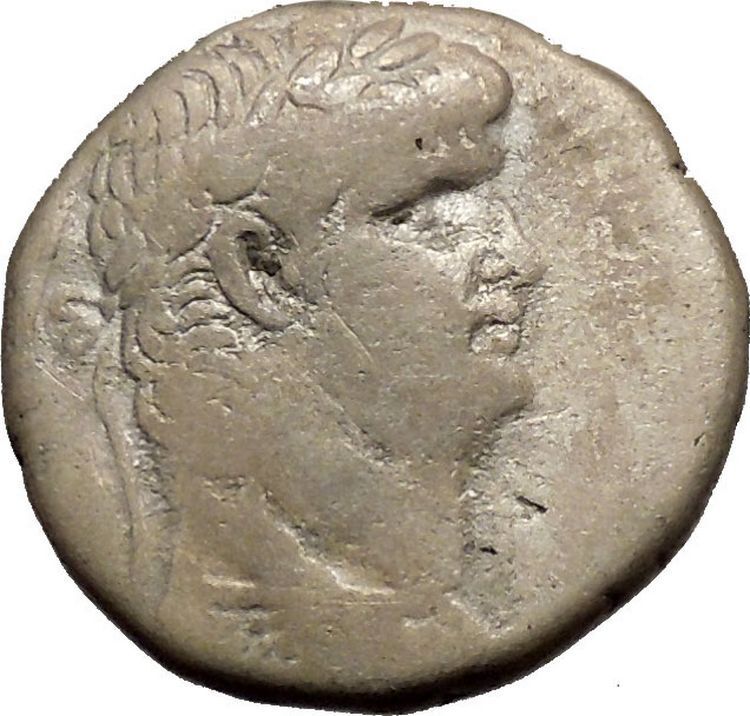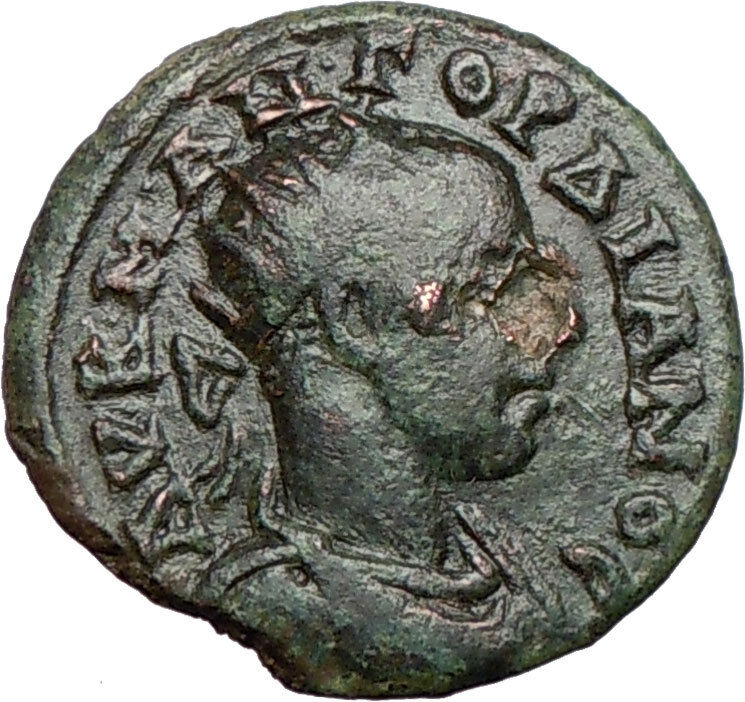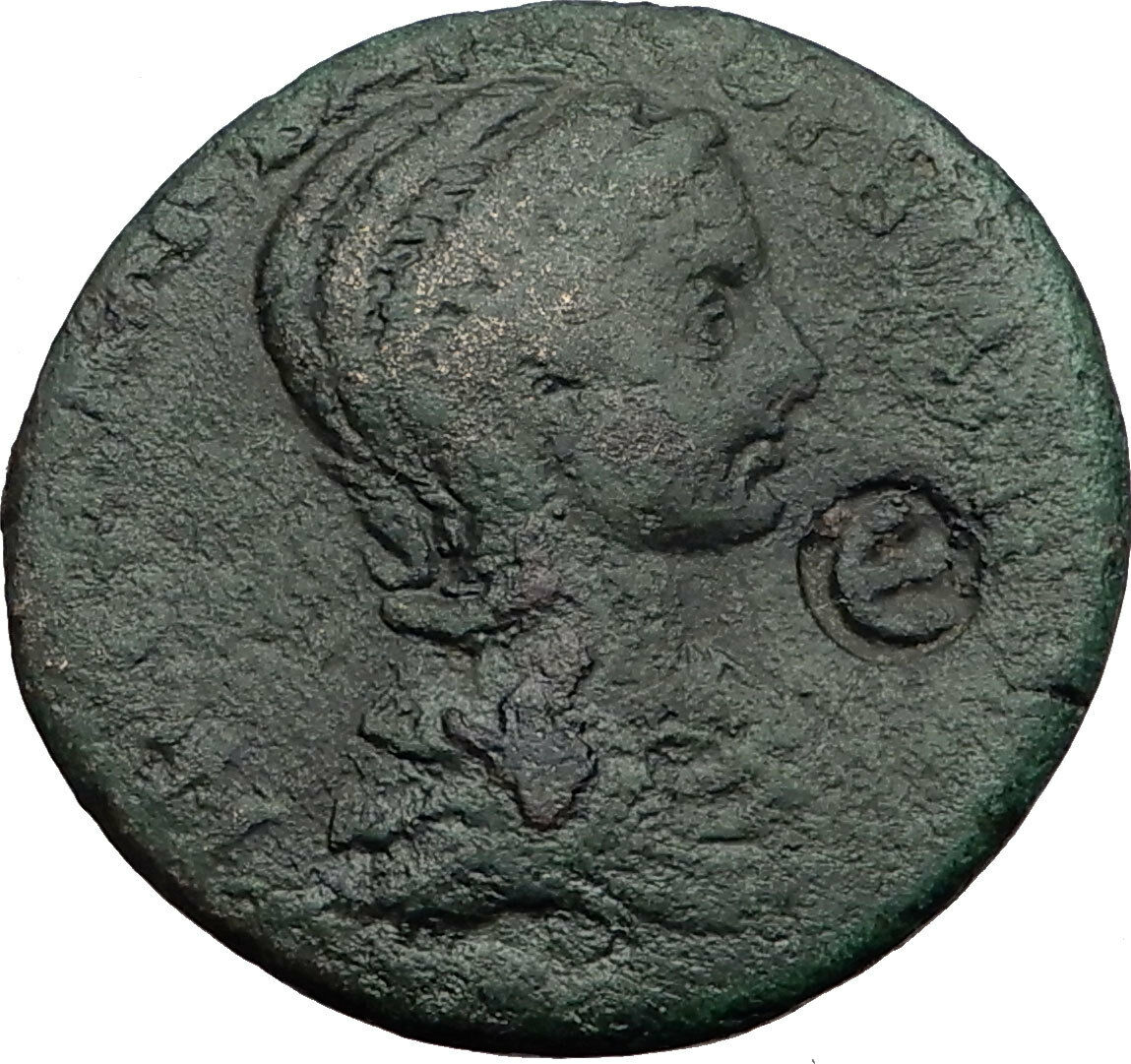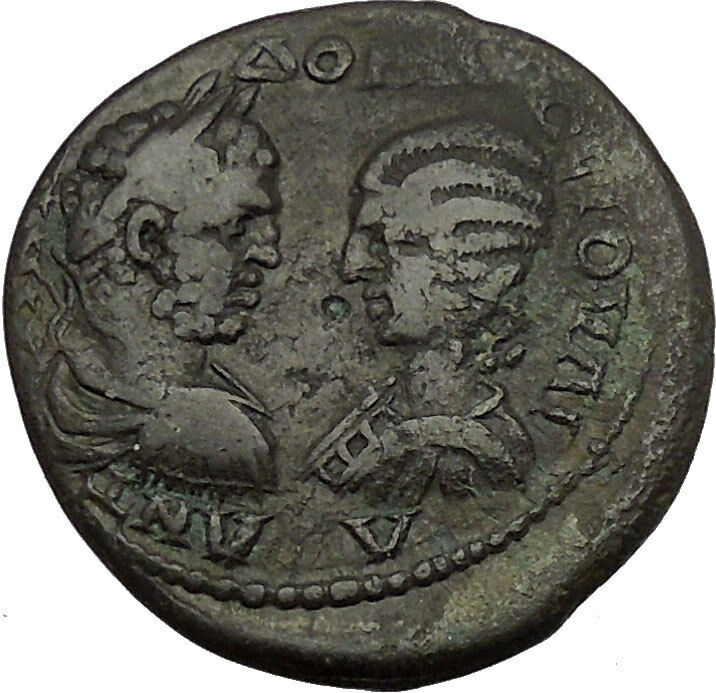|
Plotina – Roman Empress: 105-122 A.D. – wife of Trajan
Bronze 19mm (4.61 grams) of Tabae (Tabai) in Caria
Reference: RPC III 2293; SNG Copenahgen 561.
Certification: NGC Ancients XF Strike: 5/5 Surface: 3/5 5771331-011
ΠΛΩΤЄΙΝΑ СЄΒΑСΤΗ, Draped bust right.
ΤΑΒΗΝΩΝ, Nike advancing right, holding wreath and palm frond.
VERY RARE
You are bidding on the exact item pictured, provided with a Certificate of Authenticity and Lifetime Guarantee of Authenticity.
 In Greek mythology, Nike was a goddess who personified victory, also known as the Winged Goddess of Victory. The Roman equivalent was Victoria. Depending upon the time of various myths, she was described as the daughter of Pallas (Titan) and Styx (Water) and the sister of Kratos (Strength), Bia (Force), and Zelus (Zeal). Nike and her siblings were close companions of Zeus, the dominant deity of the Greek pantheon. According to classical (later) myth, Styx brought them to Zeus when the god was assembling allies for the Titan War against the older deities. Nike assumed the role of the divine charioteer, a role in which she often is portrayed in Classical Greek art. Nike flew around battlefields rewarding the victors with glory and fame. In Greek mythology, Nike was a goddess who personified victory, also known as the Winged Goddess of Victory. The Roman equivalent was Victoria. Depending upon the time of various myths, she was described as the daughter of Pallas (Titan) and Styx (Water) and the sister of Kratos (Strength), Bia (Force), and Zelus (Zeal). Nike and her siblings were close companions of Zeus, the dominant deity of the Greek pantheon. According to classical (later) myth, Styx brought them to Zeus when the god was assembling allies for the Titan War against the older deities. Nike assumed the role of the divine charioteer, a role in which she often is portrayed in Classical Greek art. Nike flew around battlefields rewarding the victors with glory and fame.
Nike is seen with wings in most statues and paintings. Most other winged deities in the Greek pantheon had shed their wings by Classical times. Nike is the goddess of strength, speed, and victory. Nike was a very close acquaintance of Athena, and is thought to have stood in Athena’s outstretched hand in the statue of Athena located in the Parthenon. Nike is one of the most commonly portrayed figures on Greek coins.
Names stemming from Nike include amongst others: Nicholas, Nicola, Nick, Nikolai, Nils, Klaas, Nicole, Ike, Niki, Nikita, Nika, Niketas, and Nico.
Tabae was a city in Caria, although, according to Strabo it was located in a plain in Phrygia on the boundaries of Caria. The place is now Tavas, near Kale, Denizli in Turkey; some inscriptions and numerous ancient remains have been found.
Stephanus Byzantius mentions two cities of this name, one in Lydia, the other in Caria. Livy[2] says that it was on the frontier of Pisidia towards the coast of the Gulf of Pamphylia. The town in question, however, some coins of which are extant, was one which claimed to have been founded by one Tabus. Others derive its name from tabi, which in Semitic languages means “good”, and others from a native word taba, meaning “rock”, which seems a probable derivation. History
In 189 BC, the consul Gnaeus Manlius Vulso, having defeated the inhabitants who blocked his passage, exacted from Tabae a fine of 25 talents and 10,000 medimni of wheat.
 Plotina – Augusta: 105-122 A.D. Plotina – Augusta: 105-122 A.D.
Wife of Trajan
Aunt of Matidia
Sister-in-Law of Marciana
‘Pompeia Plotina Claudia Phoebe Piso or Potius piolet (d. 121/122) was a Roman Empress and wife of Roman Emperor Trajan. She was renowned for her interest in philosophy, and her virtue, dignity and simplicity. She was particularly devoted to the Epicurean philosophical school in Athens, Greece. Through her influence, she provided Romans with fairer taxation, improved education, assisted the poor and created tolerance in Roman society.
Plotina was born and was raised in Tejada la Vieja (Escacena del Campo), Spain, during the reign of Roman Emperor Nero (reigned 54-68). She was the daughter of Lucius Pompeius and Plotia, who had extensive political, family and friendship connections. Trajan married her before his accession. Although they had a happy marriage, they had no known children. In 100 Trajan awarded her with title of Augusta, but she did not accept the title until 105. Plotina did not appear on the coinage until 112.
Trajan and Plotina became the guardians of the future Roman Emperor Hadrian. Hadrian was about age 10 or 11 when he lost his father, who was a first cousin to Trajan (Trajan’s father and Hadrian’s paternal grandmother were brother and sister). Plotina was fond of Hadrian and strongly encouraged his adoption by the dying Trajan. The adoption occurred at Selinunte in Cilicia, in August 117. When Plotina died she was deified. Hadrian built a temple in her honor at Nîmes.
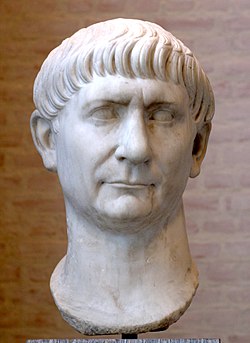 Trajan – Roman Emperor : 98-117 A.D. Trajan – Roman Emperor : 98-117 A.D.
Caesar: 97 A.D. (under Nerva) | Augustus: 98-117 A.D.
| Adopted son of Nerva | Son of Trajan Pater | Husband of Plotina | Brother of Marciana | Uncle of Matidia | Grand-uncle of Sabina |
Marcus Ulpius Nerva Traianus, commonly known as Trajan (18 September, 53 – 8 August, 117), was a Roman Emperor who reigned from AD 98 until his death in AD 117. Born Marcus Ulpius Traianus into a non-patrician family in the Hispania Baetica province (modern day Spain), Trajan rose to prominence during the reign of emperor Domitian, serving as a general in the Roman army along the German frontier, and successfully crushing the revolt of Antonius Saturninus in 89. On September 18, 96, Domitian was succeeded by Marcus Cocceius Nerva, an old and childless senator who proved to be unpopular with the army. After a brief and tumultuous year in power, a revolt by members of the Praetorian Guard compelled him to adopt the more popular Trajan as his heir and successor. Nerva died on January 27, 98, and was succeeded by his adopted son without incident.
As a civilian administrator, Trajan is best known for his extensive public building program, which reshaped the city of Rome and left multiple enduring landmarks such as Trajan’s Forum, Trajan’s Market and Trajan’s Column. It was as a military commander however that Trajan celebrated his greatest triumphs. In 101, he launched a punitive expedition into the kingdom of Dacia against king Decebalus, defeating the Dacian army near Tapae in 102, and finally conquering Dacia completely in 106. In 107, Trajan pushed further east and annexed the Nabataean kingdom, establishing the province of Arabia Petraea. After a period of relative peace within the Empire, he launched his final campaign in 113 against Parthia, advancing as far as the city of Susa in 116, and expanding the Roman Empire to its greatest extent. During this campaign Trajan was struck by illness, and late in 117, while sailing back to Rome, he died of a stroke on August 9, in the city of Selinus. He was deified by the Senate and his ashes were laid to rest under Trajan’s Column. He was succeeded by his adopted son (not having a biological heir) Publius Aelius Hadrianus-commonly known as Hadrian.
As an emperor, Trajan’s reputation has endured – he is one of the few rulers whose reputation has survived the scrutiny of nineteen centuries of history. Every new emperor after him was honoured by the Senate with the prayer felicior Augusto, melior Traiano, meaning “may he be luckier than Augustus and better than Trajan”. Among medieval Christian theologians, Trajan was considered a virtuous pagan, while the 18th century historian Edward Gibbon popularized the notion of the Five Good Emperors, of which Trajan was the second.
|









 In Greek mythology, Nike was a goddess who personified victory, also known as the Winged Goddess of Victory. The Roman equivalent was Victoria. Depending upon the time of various myths, she was described as the daughter of Pallas (Titan) and Styx (Water) and the sister of Kratos (Strength), Bia (Force), and Zelus (Zeal). Nike and her siblings were close companions of Zeus, the dominant deity of the Greek pantheon. According to classical (later) myth, Styx brought them to Zeus when the god was assembling allies for the Titan War against the older deities. Nike assumed the role of the divine charioteer, a role in which she often is portrayed in Classical Greek art. Nike flew around battlefields rewarding the victors with glory and fame.
In Greek mythology, Nike was a goddess who personified victory, also known as the Winged Goddess of Victory. The Roman equivalent was Victoria. Depending upon the time of various myths, she was described as the daughter of Pallas (Titan) and Styx (Water) and the sister of Kratos (Strength), Bia (Force), and Zelus (Zeal). Nike and her siblings were close companions of Zeus, the dominant deity of the Greek pantheon. According to classical (later) myth, Styx brought them to Zeus when the god was assembling allies for the Titan War against the older deities. Nike assumed the role of the divine charioteer, a role in which she often is portrayed in Classical Greek art. Nike flew around battlefields rewarding the victors with glory and fame. Plotina – Augusta: 105-122 A.D.
Plotina – Augusta: 105-122 A.D. Trajan – Roman Emperor : 98-117 A.D.
Trajan – Roman Emperor : 98-117 A.D.

